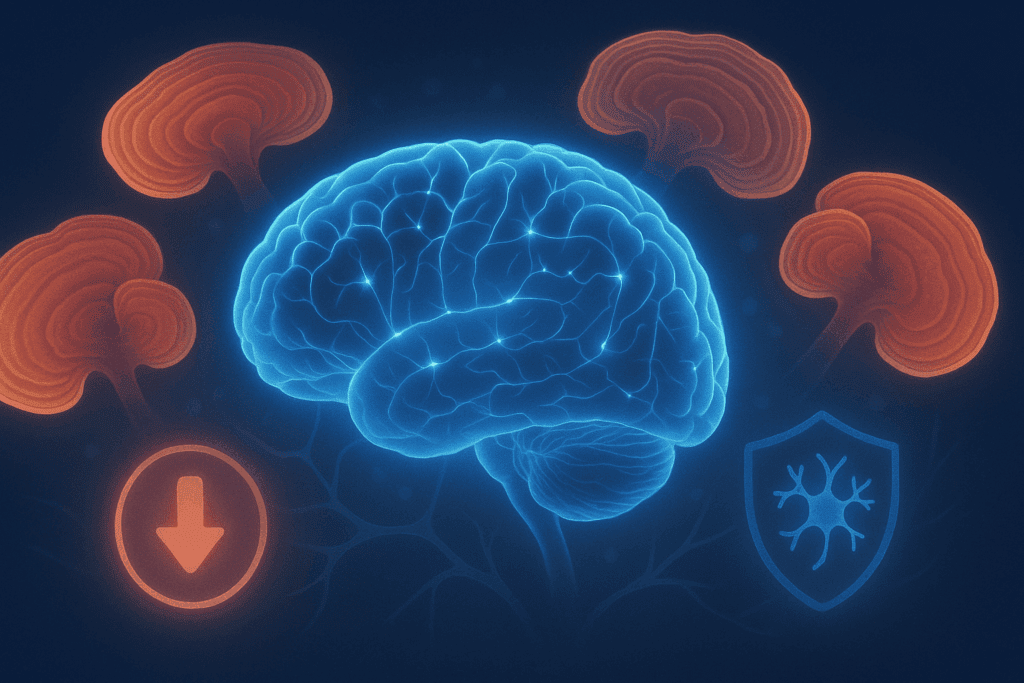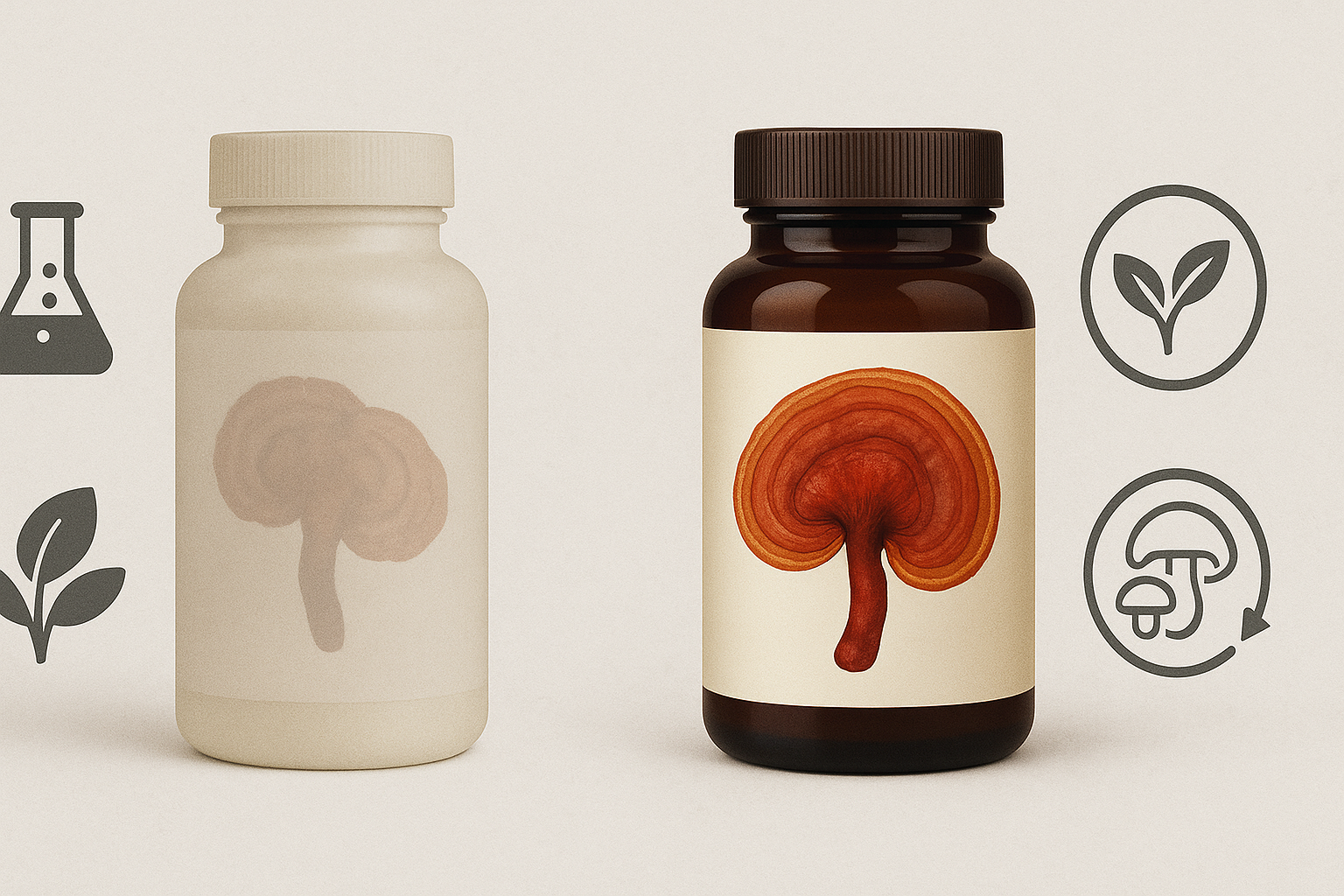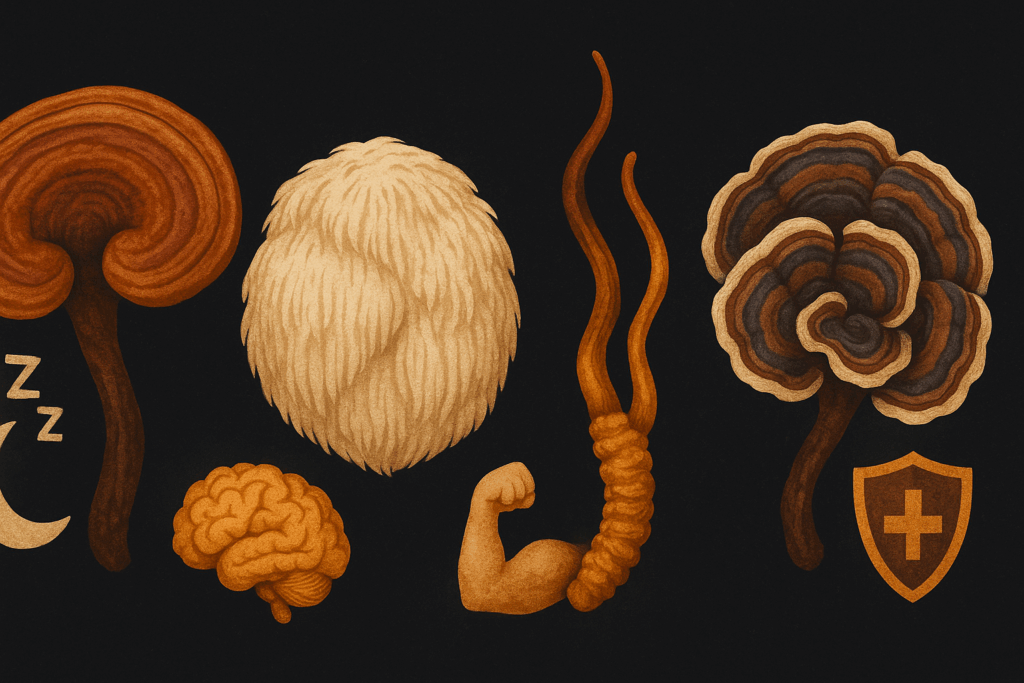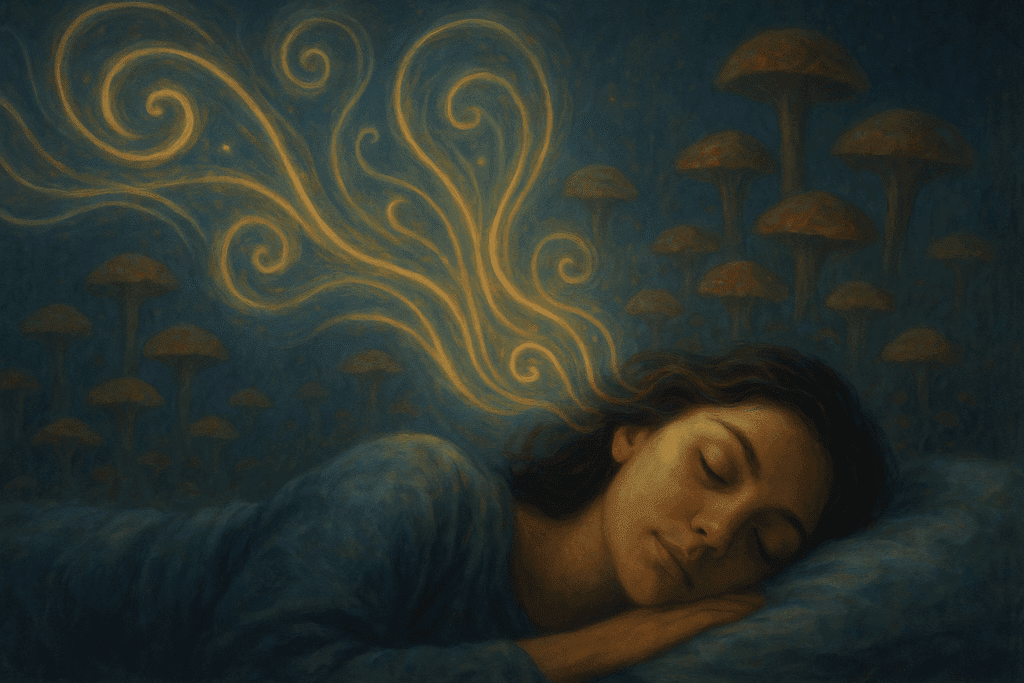Introduction: Understanding the Growing Fascination with Reishi Mushrooms for Sleep and Brain Health
As the world turns increasingly to natural solutions for sleep and cognitive enhancement, the interest in functional mushrooms has skyrocketed. Among these, Reishi mushrooms stand out for their centuries-old reputation in traditional Eastern medicine. Modern science is now beginning to validate what ancient practitioners long suspected: Reishi mushrooms may significantly support better sleep quality and mental clarity. Choosing the best Reishi mushroom supplement for sleep is more than a matter of preference; it’s about identifying high-quality formulations that truly deliver on their health promises. This guide explores the nuances of Reishi’s physiological effects, its cognitive benefits, and the leading supplements that align with scientific integrity and wellness efficacy.
You may also like: The Ultimate Guide to the Best Nootropic Mushrooms for Memory and Cognitive Enhancement

The Science Behind Reishi: Why It Works for Sleep and Cognitive Function
Reishi mushrooms (Ganoderma lucidum) have been revered in Chinese and Japanese medicine for over 2,000 years. Reishi’s bioactive compounds, especially triterpenes, polysaccharides, and peptidoglycans, are thought to play vital roles in its medicinal properties. These compounds act on various biological systems, including the central nervous system, immune regulation, and endocrine balance.
Research suggests that Reishi helps modulate the hypothalamic-pituitary-adrenal (HPA) axis, which governs stress responses. By balancing cortisol levels, Reishi creates a favorable environment for relaxation and restful sleep. Studies also show that Reishi’s triterpenes have anxiolytic properties, reducing anxiety levels that often contribute to insomnia. Simultaneously, polysaccharides in Reishi have been found to promote neurogenesis and protect neural tissue, thereby supporting memory retention and mental focus. These effects work synergistically, offering a two-fold benefit: deeper, more restorative sleep and sharper cognitive function during waking hours.

Choosing the Best Reishi Mushroom Supplement for Sleep: Key Criteria to Consider
When selecting the best Reishi mushroom supplement for sleep, one must consider several critical quality indicators. First, sourcing matters. Reishi grown on traditional hardwood logs, rather than grain substrates, tends to have higher concentrations of triterpenes. Next is extraction method. Dual-extraction processes (hot water and alcohol) are superior because they extract both water-soluble polysaccharides and fat-soluble triterpenes.
Potency is another essential factor. A supplement’s beta-glucan content should be clearly labeled, as beta-glucans are responsible for many of Reishi’s immune-modulating effects. Some top-tier products include standardized extracts that guarantee consistent dosages of active compounds. Finally, third-party testing ensures the absence of heavy metals, mold, and other contaminants. Together, these criteria distinguish a mediocre product from the best reishi mushroom supplement for sleep.
Exploring the Cognitive Enhancing Properties of Reishi Mushroom
While Reishi is widely known for its sedative properties, its benefits for cognitive enhancement are equally compelling. Emerging research points to Reishi’s neuroprotective functions, largely due to its antioxidant-rich profile. These antioxidants reduce oxidative stress in the brain, a key factor in cognitive decline and neurodegenerative diseases. Furthermore, Reishi appears to support the production of nerve growth factor (NGF), a protein that fosters the growth, maintenance, and survival of neurons.
Reishi’s adaptogenic properties also contribute to mental clarity. By helping the body adapt to physical and mental stressors, Reishi improves resilience and mental performance under pressure. In real-world scenarios, this means improved focus during work, enhanced memory retention during study sessions, and sharper decision-making capabilities. By incorporating the best reishi mushroom supplement into one’s daily regimen, users often report fewer mental fog episodes and more sustained mental energy throughout the day.

How the Best Reishi Mushroom Supplement for Sleep Supports the Circadian Rhythm
The human circadian rhythm, or sleep-wake cycle, is influenced by a variety of environmental and internal cues, including light exposure, hormone levels, and stress. Chronic stress and exposure to artificial light can disrupt this delicate balance, leading to insomnia and reduced sleep quality. Reishi mushroom plays a unique role in recalibrating the circadian rhythm by modulating melatonin production and reducing nighttime cortisol spikes.
Triterpenes in Reishi are believed to calm the nervous system, making it easier to fall asleep and stay asleep through the night. Meanwhile, its adaptogenic properties mitigate the overstimulation caused by late-night screen exposure or high-stress lifestyles. Clinical studies have indicated that consistent intake of Reishi supplements over two to four weeks leads to measurable improvements in sleep latency and duration. The best reishi mushroom supplement for sleep, when taken 30 to 60 minutes before bedtime, can thus serve as a natural anchor for healthier circadian rhythms.

Functional Mushrooms for Sleep: How Reishi Compares to Other Adaptogens
In the expanding landscape of functional mushrooms for sleep, Reishi holds a distinguished place. While other mushrooms like Lion’s Mane, Cordyceps, and Turkey Tail offer cognitive or immune benefits, Reishi uniquely excels in its sedative and anxiolytic properties. Cordyceps, for instance, is better suited for physical endurance and energy enhancement, whereas Lion’s Mane is prized for its neuroregenerative capacity.
Reishi’s sedative action is subtle but accumulative, making it especially suitable for those with chronic sleep disturbances. Unlike synthetic sleep aids that often result in grogginess or dependency, Reishi supports sleep architecture without impairing REM cycles. This gentle but effective action makes it an ideal supplement for long-term use. The best mushroom for sleep, in terms of both safety and efficacy, often turns out to be Reishi, particularly for individuals with stress-related insomnia or irregular sleep cycles.

The Best Reishi Mushroom Powder vs. Capsules: Delivery Forms Compared
The debate between Reishi mushroom powder and capsule formulations is nuanced. Each has unique advantages depending on the user’s lifestyle, preferences, and wellness goals. Powdered Reishi is typically consumed as a tea or smoothie additive, which allows for quicker absorption and a more immediate calming effect. This form is also favored in traditional settings and may offer a richer array of whole-plant compounds.
Capsules, however, offer unparalleled convenience. For individuals with busy schedules or those averse to the bitter taste of Reishi, encapsulated extracts are an ideal solution. High-quality capsules often contain dual-extracted Reishi and are standardized for triterpenes and beta-glucans. Whether one chooses powder or capsules, the key is to ensure that the product meets stringent quality standards and delivers consistent dosages. The best reishi mushroom supplement for sleep may come in either form, provided the sourcing, extraction, and testing protocols meet high benchmarks.
Best Reishi Mushroom Supplement for Sleep: What to Look for in Brand Transparency
In an industry where supplement labeling can sometimes be ambiguous, transparency is a non-negotiable marker of quality. The best Reishi mushroom supplement for sleep will always disclose detailed information about its ingredients, extraction methods, and third-party testing results. Brands that go the extra mile often publish Certificates of Analysis (COAs) that verify the potency and purity of their products.
Another sign of brand integrity is the presence of traceable sourcing. Consumers should be able to identify whether the Reishi was cultivated organically, whether it was grown on hardwood logs or grain, and whether it was harvested at the proper maturity stage. Customer service responsiveness and return policies also reflect a brand’s commitment to consumer satisfaction. Ultimately, transparency not only builds trust but also empowers consumers to make informed decisions about their health.
Synergistic Blends: Combining Reishi with Other Mushroom Supplements for Sleep
Combining Reishi with other functional mushrooms can amplify its sleep-inducing and cognitive benefits. For instance, pairing Reishi with Lion’s Mane may enhance both sleep quality and neuroplasticity. Lion’s Mane is known to stimulate nerve growth factor, which complements Reishi’s stress-reducing effects. Similarly, adding Turkey Tail can provide immune support, especially valuable during times of seasonal stress that can disrupt sleep.
Formulas that blend Reishi with adaptogens like ashwagandha or magnesium can further optimize the sleep cycle. These combinations work on different pathways—Reishi modulates the nervous system, ashwagandha calms the endocrine system, and magnesium regulates muscle relaxation. Many premium brands now offer such synergistic blends, aiming to provide holistic support. These formulations are often touted as the best mushroom supplements for sleep, as they offer layered benefits that address multiple underlying causes of insomnia.
Real-World Results: What Users Say About the Best Reishi Mushroom Supplement for Sleep
Consumer testimonials and user experiences offer valuable insights into the practical effectiveness of Reishi supplements. Many users report experiencing more restful sleep within a week of daily supplementation. Common feedback includes easier sleep initiation, fewer nighttime awakenings, and more vivid dreams—a sign of improved REM cycles. Users often highlight the absence of morning grogginess, a common drawback with synthetic sleep aids.
Mental clarity is another frequently cited benefit. Individuals who take Reishi regularly often note sharper focus, greater emotional stability, and better stress resilience throughout the day. This dual-action effect—sleep support at night and cognitive enhancement by day—is what sets Reishi apart from other sleep supplements. When users describe their go-to product as the best reishi mushroom supplement for sleep, it is typically one that has shown consistent, cumulative benefits over time.
Addressing Safety: Potential Side Effects and Interactions of Reishi Mushroom Supplements
Though Reishi is generally considered safe, it’s important to approach supplementation with awareness. Some users may experience mild side effects such as digestive discomfort, dry mouth, or allergic reactions, especially during initial use. These effects are often temporary and subside with consistent intake or dosage adjustment.
More serious interactions may occur when Reishi is combined with blood-thinning medications, as it can mildly inhibit platelet aggregation. Individuals with autoimmune conditions should also consult a healthcare provider before starting supplementation, as Reishi’s immune-modulating effects may interfere with prescribed therapies. Pregnant and breastfeeding women should avoid Reishi unless specifically advised by a medical professional. Responsible usage, combined with informed purchasing, ensures that the best reishi mushroom supplement for sleep supports wellness without unintended consequences.
Where to Buy the Best Reishi Mushroom Supplement: Online vs. In-Store Options
Consumers today have access to a wide array of purchasing options, from health food stores to e-commerce platforms. Buying online often allows for more extensive product comparisons, access to verified user reviews, and direct access to third-party lab testing documents. Retailers like Amazon, iHerb, and Thrive Market feature well-known brands and often offer subscription discounts.
On the other hand, in-store purchases provide immediacy and a tangible sense of the product’s packaging and integrity. Brick-and-mortar stores also allow buyers to ask knowledgeable staff questions. However, the selection may be limited, and prices can be higher due to overhead costs. Whether buying online or in person, the priority should always be transparency, quality certification, and alignment with one’s specific health goals. Only products that meet all these criteria should be considered among the best reishi mushroom supplements for sleep.
The Role of Reishi in Neuroendocrine Regulation and Emotional Balance
Reishi mushroom’s therapeutic potential extends beyond conventional sleep support, reaching deep into the neuroendocrine systems that govern our emotional and psychological well-being. This network, involving the hypothalamus, pituitary gland, and adrenal glands, regulates essential hormones like cortisol, adrenaline, and melatonin. When these systems are under constant strain—often from chronic psychological stress or irregular sleep patterns—emotional instability, fatigue, and cognitive fog can become daily challenges.
Reishi exerts a harmonizing influence on this axis by reducing systemic inflammation and downregulating overactive cortisol production. This restoration of hormonal balance not only supports a healthier mood but also cultivates a fertile ground for restful sleep. The adaptogenic qualities of Reishi make it uniquely equipped to buffer the body against the physiological ravages of long-term stress. In doing so, Reishi addresses the root causes of sleeplessness and cognitive disarray rather than just masking symptoms. The best reishi mushroom supplement for sleep should, therefore, be evaluated not only for its sedative potential but also for its capacity to promote deep emotional equilibrium and resilience.
Furthermore, some clinical studies indicate that individuals suffering from mild anxiety or depression may experience improved mood stability and motivation after several weeks of consistent Reishi supplementation. While more large-scale, peer-reviewed research is needed to confirm these effects across wider populations, early findings suggest that Reishi’s support of the neuroendocrine system has far-reaching implications for emotional well-being. For those navigating the mental health toll of sleep deprivation or cognitive overload, Reishi offers a safe, sustainable path to balance.

Reishi and REM: Enhancing Dream Cycles and Cognitive Restoration
Sleep is not a monolithic state but a dynamic sequence of cycles that include light sleep, deep sleep, and REM (rapid eye movement) sleep. Each phase plays a crucial role in physical and mental restoration, but REM sleep is particularly essential for emotional processing, memory consolidation, and problem-solving. When REM sleep is disrupted, the result can be irritability, impaired judgment, and decreased learning capacity. The best reishi mushroom supplement for sleep must support not just sleep duration but also sleep quality—especially the integrity of REM cycles.
Research into Reishi’s influence on sleep architecture suggests that the mushroom may help prolong REM phases by reducing nocturnal awakenings and enabling more seamless transitions between sleep stages. These benefits are attributed to Reishi’s calming effect on the central nervous system, which minimizes sleep disruptions caused by anxiety or overstimulation. Individuals who regularly use Reishi supplements often report more vivid dreams and a greater sense of refreshment upon waking—both signs of deeper REM activity.
Cognitively, enhanced REM sleep translates into better memory consolidation and creative thinking. In professions or lifestyles that demand constant learning and adaptive problem-solving, the benefits of Reishi’s sleep-enhancing qualities are particularly valuable. By reinforcing REM sleep, Reishi indirectly strengthens the brain’s capacity to integrate new information, adapt to challenges, and recover from cognitive fatigue. Over time, this creates a feedback loop where improved sleep leads to better cognition, which in turn reduces stress and further enhances sleep—a virtuous cycle that the best reishi mushroom supplement for sleep can effectively support.
Understanding the Pharmacokinetics of Reishi: How It Works in the Body
To fully appreciate the effectiveness of Reishi mushroom, it’s crucial to understand how its bioactive components are metabolized and utilized by the body. Upon ingestion, Reishi’s polysaccharides and triterpenoids undergo partial digestion in the gut, where they interact with the microbiome. These interactions stimulate the growth of beneficial bacteria and enhance mucosal immunity, which in turn can positively influence systemic inflammation and mood regulation.
The triterpenoids in Reishi, known for their lipid solubility, are absorbed through the intestinal lining and enter the bloodstream, where they exert anti-inflammatory and sedative effects on the central nervous system. This is particularly relevant for individuals seeking functional mushrooms for sleep, as the central action of triterpenoids helps reduce overactivity in brain regions associated with stress and anxiety. Meanwhile, the polysaccharides support immunological homeostasis, which is often disrupted in those suffering from poor sleep or chronic fatigue.
Interestingly, recent studies have begun exploring the role of hepatic metabolism in modulating the effects of Reishi. The liver acts as a secondary processing center for many of Reishi’s compounds, and the health of this organ can influence how effectively the mushroom’s active ingredients are circulated and utilized. This pharmacokinetic complexity underscores the importance of choosing high-quality supplements, as poorly formulated products may fail to deliver effective concentrations to key tissues. The best reishi mushroom supplement for sleep will use optimized extraction methods and include bioavailability enhancers to maximize efficacy.
Reishi in Integrative Sleep Therapies: A Complementary Approach
As integrative medicine continues to gain traction among both practitioners and patients, Reishi is increasingly being adopted as part of multi-modal strategies to manage sleep disorders and cognitive fatigue. Rather than relying solely on pharmaceutical sedatives, many individuals are now embracing a holistic approach that combines behavioral interventions, nutritional support, and adaptogenic supplementation. In this context, Reishi’s role is both foundational and synergistic.
When used in conjunction with practices like cognitive behavioral therapy for insomnia (CBT-I), meditation, and controlled light exposure, Reishi enhances the efficacy of these interventions by stabilizing the physiological terrain on which they operate. For instance, mindfulness-based stress reduction techniques are more effective when the underlying neuroendocrine system is not in a constant state of overdrive. The calming properties of Reishi help create this internal calm, making other treatments more potent and easier to implement consistently.
Nutritionists and naturopathic doctors often recommend pairing Reishi with other supportive nutrients such as magnesium, L-theanine, and B vitamins, which further promote nervous system balance. These integrative protocols are designed not just to eliminate sleep disruptions but to build long-term resilience and mental clarity. As a result, the best reishi mushroom supplement for sleep becomes a cornerstone of a broader wellness strategy—one that treats the individual as a complex, interconnected system rather than a collection of symptoms to be suppressed.

Reishi and Aging: Cognitive Preservation Through Adaptogenic Support
Aging inevitably brings physiological changes that can affect both sleep quality and cognitive sharpness. Reduced melatonin production, increased oxidative stress, and declining neuroplasticity are all common as we grow older. These changes often manifest as fragmented sleep, forgetfulness, or slower information processing. Reishi mushroom, with its unique blend of adaptogenic and neuroprotective compounds, presents a natural and effective option for mitigating these age-related challenges.
Triterpenes and polysaccharides found in Reishi have been shown to combat oxidative damage, which is a key contributor to cognitive decline. These compounds neutralize free radicals and reduce inflammation in neural tissues, helping to preserve the structure and function of brain cells. Moreover, studies suggest that Reishi stimulates the expression of genes associated with neuronal regeneration and mitochondrial efficiency. This is particularly significant for older adults seeking ways to maintain their cognitive edge without relying on stimulant-based nootropics.
In terms of sleep, aging is often associated with shorter sleep duration and a reduced proportion of deep sleep stages. Reishi’s ability to stabilize the circadian rhythm and reduce nocturnal awakenings makes it especially valuable for older populations. The best reishi mushroom supplement for sleep not only addresses immediate symptoms like insomnia but also supports the broader goal of aging well—maintaining mental clarity, emotional stability, and physical resilience over time.
Frequently Asked Questions About the Best Reishi Mushroom Supplement for Sleep
1. What sets the best reishi mushroom supplement for sleep apart from generic mushroom products?
The best reishi mushroom supplement for sleep is uniquely formulated with standardized concentrations of bioactive compounds like triterpenes and beta-glucans, which directly support relaxation and sleep quality. Unlike general mushroom products, these supplements are typically dual-extracted to capture both water-soluble and fat-soluble constituents for maximum efficacy. Additionally, premium reishi sleep products undergo rigorous third-party testing to ensure they are free from contaminants such as heavy metals or mold. Some leading brands also include synergistic ingredients like magnesium or ashwagandha to enhance their sedative effects. When choosing among mushroom supplements for sleep, consumers should prioritize transparency, clinical formulation, and sourcing integrity.
2. Can the best reishi mushroom supplement for sleep also improve long-term cognitive performance?
Yes, long-term use of high-quality Reishi supplements may contribute to better cognitive performance by supporting neuroplasticity and reducing neuroinflammation. While the immediate effect of reishi sleep products is relaxation and improved sleep architecture, their neuroprotective properties can preserve brain health over time. Research has shown that compounds in Reishi help reduce oxidative stress in the hippocampus and cerebral cortex—areas critical to memory and learning. As sleep quality improves, so does the brain’s ability to consolidate memory and regulate emotional responses. Therefore, the best reishi mushroom supplement provides not just sleep support, but also long-term cognitive resilience.
3. How do mushrooms for sleep compare to traditional herbal remedies like valerian root or chamomile?
Mushrooms for sleep, particularly Reishi, operate through different biochemical pathways compared to traditional herbs. While valerian root and chamomile work mainly by modulating GABA receptors, Reishi also interacts with the hypothalamic-pituitary-adrenal axis and immune system. This makes functional mushrooms for sleep more comprehensive in addressing the physiological causes of sleep disturbances. Moreover, Reishi is adaptogenic, meaning it helps the body respond better to stress over time—an effect not typically seen with conventional sedatives. For users seeking sustainable and multi-dimensional sleep support, mushroom supplements for sleep may offer a broader range of benefits.
4. What time of day is best to take reishi sleep supplements for maximum benefit?
Most experts recommend taking reishi sleep supplements 30 to 60 minutes before bedtime to align with your body’s natural wind-down period. However, individuals with particularly high stress levels may benefit from a divided dose, taking one in the late afternoon and another at night. Because the best reishi mushroom supplement for sleep works cumulatively, consistency is more important than exact timing. It’s also advisable to avoid caffeine or stimulants during the evening, as these can interfere with the calming effects of Reishi. Ultimately, personalized experimentation will help determine the most effective timing based on your individual rhythm and lifestyle.
5. How does the best reishi mushroom powder compare to encapsulated supplements?
The best reishi mushroom powder often offers faster absorption and a broader spectrum of nutrients due to its less processed nature. Powders can be incorporated into warm teas or smoothies, allowing users to create relaxing nighttime rituals. On the other hand, encapsulated supplements provide precise dosages and are more convenient for travel or tight schedules. From a pharmacological standpoint, both formats can be equally effective if they come from high-quality sources. Whether choosing capsules or the best reishi mushroom powder, ensure that the supplement has undergone dual extraction and includes third-party lab verification.
6. Are there any emerging trends in the formulation of mushroom supplements for sleep?
Yes, one emerging trend is the integration of multiple mushrooms into one synergistic blend. Increasingly, supplement developers are combining Reishi with Lion’s Mane, Cordyceps, and even melatonin to target both sleep and cognitive optimization. Some formulas also incorporate bioavailability enhancers like black pepper extract to improve absorption. In the premium market, we’re also seeing innovations like liposomal delivery systems and nano-emulsified extracts, which allow for more efficient transport across the blood-brain barrier. These advances make today’s functional mushrooms for sleep more potent and targeted than ever before. The evolution of these formulations continues to push the boundaries of holistic sleep science.
7. Is it safe to take reishi mushroom sleep supplements every night?
For most healthy individuals, Reishi is safe to take nightly as part of a wellness routine. The best reishi mushroom supplement is non-habit forming and does not suppress natural melatonin production like synthetic alternatives. Still, it’s important to follow dosage guidelines and consult a healthcare provider, especially if you’re on blood thinners or have autoimmune conditions. Long-term use may also benefit from occasional breaks to allow the body to recalibrate. Compared to conventional sleep aids, mushrooms to help sleep offer a gentler and more sustainable solution with a lower risk of dependency or side effects.
8. How does Reishi interact with lifestyle factors like diet and screen time?
Reishi can be more effective when used alongside healthy lifestyle practices. Diets high in processed sugars and poor in magnesium or B vitamins can undermine the benefits of mushroom supplements for sleep. Likewise, excessive screen time before bed suppresses melatonin production, counteracting Reishi’s circadian support. Establishing a calming nighttime routine—such as journaling, stretching, or drinking a Reishi-infused herbal tea—can amplify its sleep-inducing properties. Reishi works best as part of a comprehensive lifestyle strategy aimed at sleep hygiene, not as a standalone solution.
9. What makes the best reishi supplement stand out in terms of manufacturing standards?
The best reishi supplement adheres to rigorous Good Manufacturing Practices (GMP) and undergoes third-party testing to confirm purity and potency. Companies that publish Certificates of Analysis (COAs) for every batch demonstrate a commitment to transparency. Additionally, using organic, log-grown Reishi rather than grain-based mycelium ensures higher concentrations of therapeutic compounds. Some elite brands also implement DNA verification to confirm species authenticity, an important step given the prevalence of mislabeled products in the market. If you’re looking for the best mushroom for sleep, these markers of quality are non-negotiable.
10. Can Reishi help address the psychological causes of insomnia, such as anxiety and racing thoughts?
Absolutely. Reishi’s adaptogenic properties target the stress-response system, helping to calm mental overactivity and reduce anxiety—two major contributors to insomnia. While it doesn’t function as a sedative in the traditional sense, it promotes a sense of balance that makes it easier to unwind mentally. Anecdotal reports and small clinical trials have shown that individuals with high stress sensitivity or generalized anxiety may particularly benefit from Reishi supplementation. By reducing the mental “noise” that often keeps people awake, Reishi sleep supplements offer an elegant solution for those struggling with emotional restlessness. This positions the best reishi mushroom supplement for sleep as both a psychological and physiological ally in restoring healthy rest.
Conclusion: Embracing the Best Reishi Mushroom Supplement for Sleep and Cognitive Clarity
In a world increasingly affected by chronic stress, digital fatigue, and sleep disorders, the search for natural, sustainable remedies has never been more urgent. Reishi mushroom, with its unparalleled profile of bioactive compounds and adaptogenic properties, emerges as a leading contender among functional mushrooms for sleep and brain health. The journey to better rest and mental clarity begins with informed, intentional choices—starting with the best reishi mushroom supplement for sleep.
From its ability to modulate stress hormones and promote restorative sleep to its role in enhancing memory and mental resilience, Reishi offers a comprehensive solution rooted in both tradition and scientific validation. By prioritizing quality, transparency, and synergistic formulation, consumers can experience tangible improvements in sleep architecture, cognitive function, and overall well-being. As more individuals turn to mushrooms to help sleep and support cognitive performance, Reishi continues to stand out not only for what it promises but for what it consistently delivers. Choosing the best reishi mushroom supplement is not merely a step toward better rest—it’s an investment in a more focused, vibrant, and resilient life.
